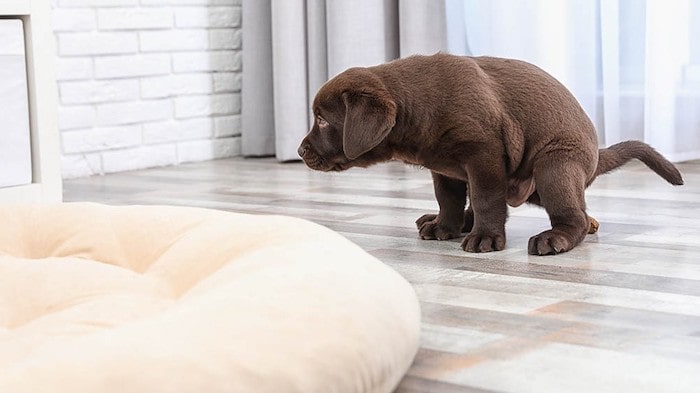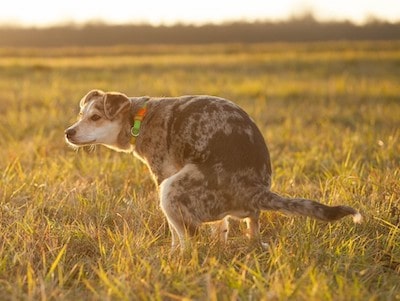If you’ve ever found yourself recoiling in disgust while cleaning up after your canine companion, you’re not alone. Many dog owners wonder, “Why does my dog’s poop smell so bad?”
It’s a valid question, and in this article, we will delve into the possible reasons behind this unpleasant phenomenon.
By understanding the factors that contribute to the foul smell, we can not only gain insights into our dogs’ health but also take necessary steps to address the issue.
So, hold your nose and join us as we unravel the aromatic enigma of why our dogs’ poop emits such an offensive odor.
Contents
What Causes Dog Poop to Smell Bad?
Dog poop is naturally smelly, but a serious stink can be a sign of multiple health issues. A really bad smell may mean your dog’s digestive system isn’t adequately processing their food.
Certain medications can also lead to extra stinky poop, as can some infections, such as giardiasis, which is caused by a parasite called Giardia.

Other factors that can contribute to bad-smelling poop include changes in diet, food sensitivities or allergies, consumption of a foreign object, parasites, inflammation of the colon or pancreas, and malabsorption.
The color, shape, size, consistency, and volume of your dog’s poop can also tell you a lot about their health. A healthy stool should be firm, with just a light smell and deep brown color. If you notice any changes in these qualities, consult your veterinarian right away.
Common Factors That Can Affect Your Dog’s Poop Odor
There are many possible causes of bad-smelling dog poop, and some of them are more serious than others. Here are some of the most common ones:
1) Diet: What your dog eats can have a big impact on the smell of his poop. Some foods that can cause bad-smelling dog poop include low-quality kibble, table scraps, dairy products, spicy foods, garlic, onion, etc.
These foods can either be hard to digest for your dog, or contain compounds that produce foul-smelling gases when broken down in the gut.
To avoid this problem, feed your dog a high-quality diet that is appropriate for his age, size, and activity level. Avoid giving him human food or treats that are not meant for dogs. You can also try adding some probiotics or digestive enzymes to his food to help him digest better.
2) Health conditions: Some health issues that can affect your dog’s digestive system can also cause bad-smelling dog poop. For example, infections, inflammation, tumors, ulcers, or blockages in the stomach or intestines can cause diarrhea, blood, mucus, or pus in the stool, which can make it smell worse.
Other conditions that can affect the odor of your dog’s poop include liver disease, kidney disease, diabetes, pancreatitis, etc. These conditions can alter the metabolism or excretion of waste products in your dog’s body.
If you notice any signs of illness in your dog, such as vomiting, loss of appetite, weight loss, lethargy, etc., take him to the vet as soon as possible for diagnosis and treatment.

3) Parasites: Parasites are another common cause of bad-smelling dog poop. Some parasites that can infect your dog’s intestines include roundworms, hookworms, tapeworms, whipworms, giardia, coccidia, etc.
These parasites can cause inflammation, diarrhea, blood, mucus, or eggs in the stool, which can make it smell worse. They can also rob your dog of nutrients and weaken his immune system.
To prevent parasite infections, you should deworm your dog regularly and keep his environment clean. You should also check his stool for any signs of worms or eggs, and take him to the vet if you find any.
4) Medications: Some medications that your dog may take for various reasons can also affect the smell of his poop. For example, antibiotics can disrupt the balance of bacteria in your dog’s gut, which can lead to diarrhea or foul-smelling gas.
Other medications that can cause bad-smelling dog poop include steroids, anti-inflammatories, chemotherapy drugs, etc. These medications can either interfere with digestion or alter the chemical composition of waste products in your dog’s body.
If your dog is on any medication, you should follow the instructions carefully and monitor his stool for any changes. You should also consult your vet if you have any concerns or questions about the side effects of the medication.
Tips for Reducing Dog Poop Odor
While some causes of bad-smelling dog poop may require medical attention, there are some things you can do to reduce the odor and make it easier to deal with. Here are some tips:
1) Pick it up promptly: One of the simplest and most effective ways to reduce dog poop odor is to pick it up as soon as possible after your dog does his business.
This will prevent the smell from spreading and attracting flies or other pests. It will also keep your yard or neighborhood clean and hygienic.
You should always carry a plastic bag or a scooper with you when you walk your dog, and dispose of his waste properly in a trash bin or a designated area. You should also clean up any accidents that may happen indoors or in your car.
2) Use odor-neutralizing products: Another way to reduce dog poop odor is to use products that can neutralize or mask the smell. There are many products available in pet stores or online that claim to do this, such as sprays, powders, granules, tablets, etc.
Some of these products work by breaking down the odor-causing molecules in the poop, while others work by releasing pleasant scents that cover up the smell.
You can apply these products directly on the poop before picking it up, or sprinkle them around the area where your dog poops regularly.
However, you should be careful not to use too much or too often, as some products may contain chemicals that could be harmful to your dog or the environment.

3) Clean the dog’s anal glands: Another possible source of bad-smelling dog poop is the anal glands. These are two small sacs located on either side of your dog’s anus that secrete a smelly fluid when he defecates or when he is scared or excited.
This fluid helps mark his territory and communicate with other dogs. However, sometimes these glands can become clogged or infected, which can cause them to leak or burst, releasing a foul odor that can linger on your dog’s fur or stool.
To prevent this problem, you should check your dog’s anal glands regularly and have them expressed by a groomer or a vet if they are full or inflamed. You should also keep your dog’s rear end clean by wiping it with a damp cloth or a baby wipe after he poops.
FAQ
Can a change in my dog’s diet help reduce the odor of their poop?
Yes, changing your dog’s diet can have an impact on the smell of their poop. A high-quality, balanced diet that suits your dog’s specific needs can promote better digestion and result in less odorous waste. Consulting with a veterinarian about dietary changes is recommended.
Should I be concerned if my dog’s poop consistently has a strong odor?
If your dog’s poop consistently emits a strong and offensive odor, it’s wise to pay attention and investigate further. While some odor is normal, an unusually strong smell could indicate an underlying health issue that needs to be addressed. It’s recommended to consult with a veterinarian to rule out any potential problems.
When should I seek veterinary advice regarding my dog’s smelly poop?
If you notice persistent or worsening odor, changes in your dog’s behavior, appetite, or any other concerning symptoms, it’s crucial to seek veterinary advice promptly. A veterinarian can conduct a thorough examination, perform necessary tests, and provide appropriate treatment or recommendations based on your dog’s specific condition.
Can the odor of my dog’s poop indicate a serious health issue?
In some cases, a strong or unusually foul odor in your dog’s poop can be an indication of an underlying health issue. It’s important to observe your dog’s overall health, eating habits, and any accompanying symptoms to determine if further investigation or veterinary attention is necessary.
Conclusion
In conclusion, the foul smell emanating from your dog’s poop can be a source of concern and discomfort for any dog owner.
By exploring the possible causes behind this unpleasant odor and understanding the factors at play, we can take proactive steps to address the issue.
From diet and gastrointestinal health to potential medical conditions, there are various factors that can contribute to the foul smell.
Remember, a healthy and balanced diet, regular veterinary check-ups, and proper waste disposal practices can go a long way in minimizing the odor and ensuring your dog’s overall well-being.

A retired veterinary technician and full-time dog parent. James knows to serve the community with the best of his knowledge of animal healthcare. He has been working in a known veterinary clinic for quite a few years. He loves reading blogs on pet nutrition and writes unbiased reviews of dog products.


